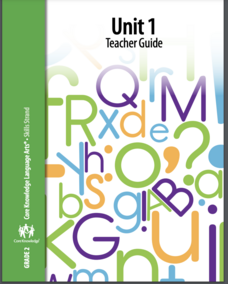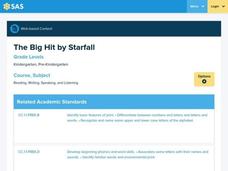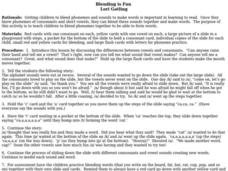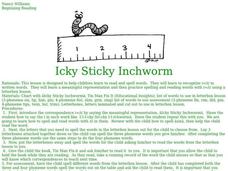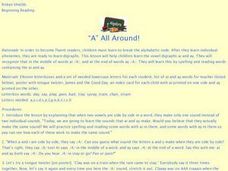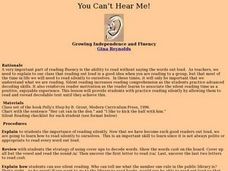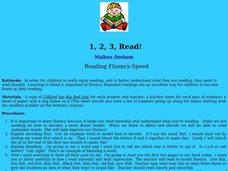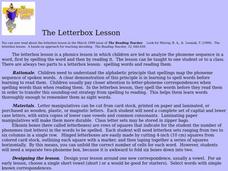Core Knowledge Foundation
Second Grade Skills Unit 4: The Job Hunt
Second graders practice skills, including spelling, grammar, and reading. Pupils examine vowel sounds and tricky words, nouns, and verbs. They begin the writing process by drafting a persuasive letter and decoding texts.
Core Knowledge Foundation
Second Grade Skills Unit 1: The Cat Bandit
For twenty-two lessons over five weeks, scholars practice sound-spelling correspondence, spelling patterns, tricky words, and reading decodable text. Assessments aid in small group formation and gauge comprehension. Lessons begin with a...
Curated OER
Phonics
This short, 6-slide presentation provides practice for very young readers in decoding simple words that utilize the short vowel sounds. Words such as cat, sit, hop, and dog are read by pupils.
Curated OER
Stackers Game for word fluency
Students create three letter words and decode for fluency and accuracy. In this fluency lesson, students use alphabet tiles to build words with the CVC pattern and read the word aloud. Students alternate turns by stacking one...
Curated OER
Smart Board Syllable Activity
Young scholars divide words, using syllable division rules. They divide two and three syllable words. They follow Orton-Gillingham rules and use the first three division rules.
Meadows Center for Preventing Educational Risk, University of Texas at Austin
Lesson 9 - Contractions
Is it do'nt or don't? How about doesn't or does'nt? A lesson on contractions helps learners identify, form, and use contractions. Components within the plan include direct instruction on decoding and encoding contractions, as well as...
University of Texas
Alphabetic Understanding, Phonics, and Spelling
Have your youngsters reading in no time with with collection of literacy activities and lessons. Starting with a basic understanding of the alphabet, this unit progressively builds students' phonemic awareness and ability to decode...
Reading Resource
Painting Sentences
Paint with the colors of reading! Learners in special education classes or mainstream classes practice decoding basic and advanced code with a series of sentences on paint blobs. Once they read the sentence, learners cover one spot on...
Curated OER
The Big Hit
Students are introduced to the phonetic sound associated with the short letter "i" and listen to a story which includes words with this sound. In this the big hit starfall lesson, students build sound letter accuracy. Students also...
Curated OER
Word Recognition
Students recognize and spell color and shape words. In this color and shape words lesson plan, students reinforce their vocabulary and spelling skills.
Alabama Learning Exchange
Phonics lesson for -ick family
Kindergarteners and first graders develop phonemic awareness for words that contain -ick. Each learner gets a stack of cards with different -ick words, highlighting the target sound as they review each one.
Curated OER
How Many Feet Will We Meet?
Emerging speakers distinguish between the sounds for short vowel /e/ and long vowel /e/. They are introduced to the vowel patterns that comprise the long vowel sounds, with emphasis on /ee/. They practice reading and spelling a variety...
Curated OER
Blast-Off to Blending
Practice working with different phonemes in consonants and vowels. Sounds are written on squares that get put on a rocket to "blast off" and meet other sounds. The teacher first models blending, then reads the new words. Young readers...
Curated OER
Amazing As
Help young readers recognize the short vowel /a/ in written and spoken language. Through matching and listening activities, they discriminate the vowel sound /a/ from other phonemes. Learners associate the phoneme with its letter...
Curated OER
Blending is Fun
Use a poster picture of a slide to illustrate the blending of phonemes in words. First show your youngsters basic examples like cat and cap. Then have learners work in pairs to create some blends of their own! Provide words for them to...
Curated OER
Icky Insect Is In Icky Sticky Ink
Practice the strategy of letter-sound correspondence when identifying the short vowel /i/ sound in written and spoken words. The teacher recites the tongue twister "Icky insect is in icky sticky ink," while listeners repeat. Letter boxes...
Curated OER
Reading Bugs
Review the phonemic sounds of the alphabet letters before examining how to blend letter sounds to make a word. During this teacher-modeled lesson, learners make word bugs out of three phonemes that blend together. As an assessment, read...
Curated OER
Icky Sticky Inchworm
Use the meaningful example "Icky Sticky Inchworm" to demonstrate the /i/ sound. Then have learners take out letter boxes and spell simple words like six, lip, him, pin, slim, grin, etc.
Curated OER
Aches and Pains
Being able to distinguish between short and long vowel /a/ sounds is an important skill for young readers. They are introduced to the vowel-consonant-e pattern that changes short vowel sounds into long vowel sounds. They practice reading...
Curated OER
Icky Sticky Fingers
Practice recognizing the short vowel /i/ in written and spoken language. Introduce the target sound with a fun tongue twister about Lizzy the lizard. Through matching and listening activities, learners discriminate the vowel sound /i/...
Curated OER
"A" All Around
Spell and read words containing ai and ay. First and second graders identify vowel digraphs in written and spoken language. After a brief discussion on the combinations of letters that comprise digraphs, they practice reading and...
Curated OER
You Can't Hear Me!
Teach the skill of reading silently through modeling. The teacher demonstrate how to read silently and also gives instructions on decoding skills. Individuals then read silently using the book Polly's Shop . The teacher...
Curated OER
1, 2, 3, Read!
Explain to your readers a variety of decoding strategies to improve their reading fluency. They observe the teacher modeling blending, then in pairs take turns reading the book Clifford the Big Red Dog. Learners then time each other...
Curated OER
The Letterbox Lesson
Students analyze phoneme sequence in a word. They spell words using phoneme analysis and read new words using phoneme analysis.



